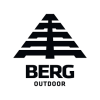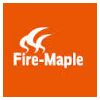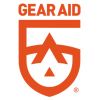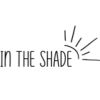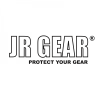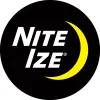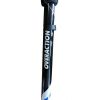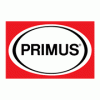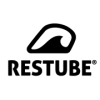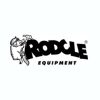Summer Tents
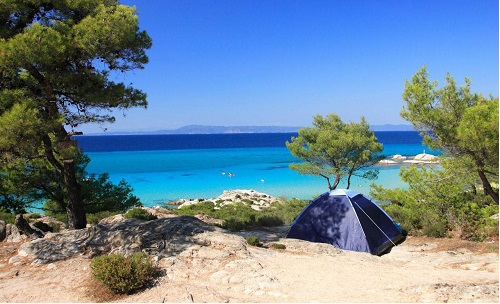
Buying a tent can be tricky. There are numerous options for camping tents, the cost can get really high, and you don't want to end up with the wrong tent on a camping trip.
So let's start with the first and most important decision you'll make when choosing your tent: what kind of camping are you going to do?
There are four main styles that tents are categorized into: summer (think bigger and heavier), 3-season (think lightweight), 4-season (think warmer and durable), and ultralight which we talked about in a previous article
In this article we will talk about summer tents and what to consider when choosing a summer tent.In summary, we need to look at five key factors that are considered most important in determining the overall performance of a tent:
1. Space and Comfort
2. Weather resistance
3. Ease of use
4. Durability
5. Family friendliness
Let's look at them one by one:
1. . Space and Comfort
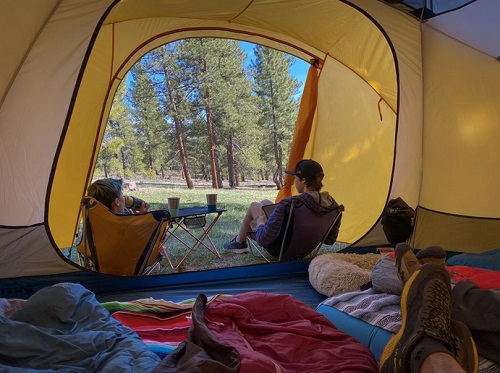
When camping less than 30 meters from your car, the weight and size of the tent is not an issue, so you can focus on comfort and luxury. Usually a larger tent is the best choice to comfortably fit you and your gear.
On the other hand, if you're going to walk quite a bit to get to your destination, you'll be adding weight.
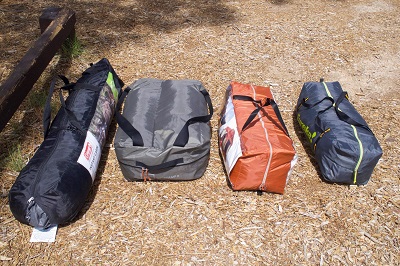
There are tons of lightweight summer tent options so you can hike comfortably while carrying your tent.
Finally, in addition to the weight, before making your choice you should consider the dimensions of the tent, and especially the height which is a determining factor of comfort inside the tent.
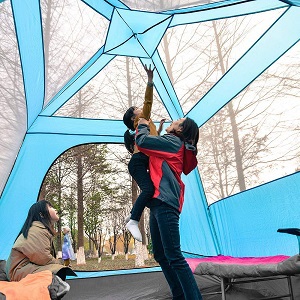
Vestibule
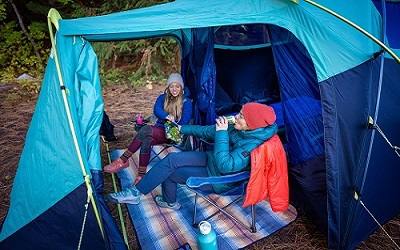
This contributes significantly to the comfort of a tent. Think of the vestibule as your porch. Wet clothes, backpacks or bicycles are better protected in a vestibule than outside. This keeps them reachable and still protected from the weather. Tents with vestibules feel larger. And if a storm does come, it will allow you to cook outside while you wait for the storm to pass.
Pockets, pouches and storage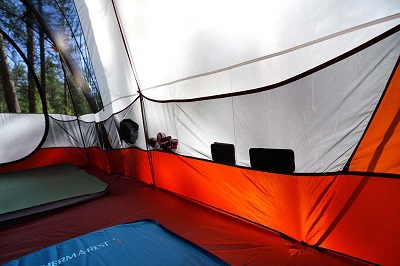
This can also add to the comfort factor. It's always nice to have a pocket to put your phone and other personal items so they stay safe from your feet and don't get tangled under sleeping bags. While the number of pouches is a factor, so is their size and location. Some tents also have clotheslines to keep your stuff up, or have removable pockets so you can place them wherever you think is better.
Bed space
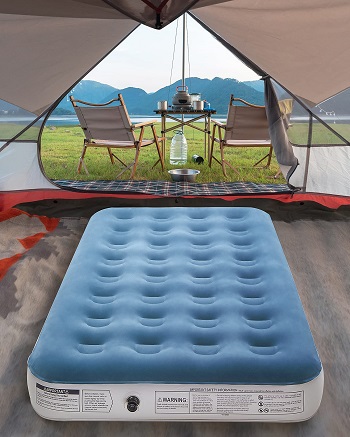
Camping has evolved a lot in the last 20 years. It's hard to think of camping now without an air mattress. As we said if you are camping near your car you can get a large and comfortable air mattress. They are cheap and add a lot of comfort. For people with back problems or high sleep requirements, the ability to bring an air mattress ultimately makes camping a pleasant experience. A good rule of thumb when considering what size of tent to get, is that a twin bed will take up two sleeping spots. So a 4 person tent usually fits two twin beds.
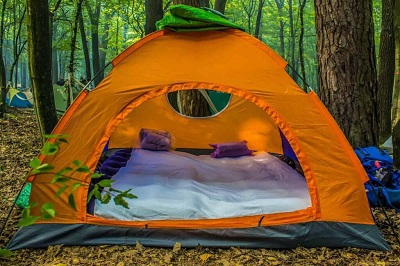
2. Weather resistance
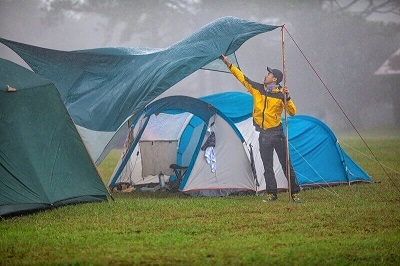
Anyone who has a little experience camping out will tell you that even on the hottest day, the weather can change overnight. You may encounter wind or rain or worse, both. Being prepared for any eventuality is important. Accordingly, extreme heat in a poorly ventilated tent can be almost as unpleasant as sleeping in a wet sleeping bag. So it is good to consider all these features of a tent before buying one. Specifically for the summer, our requirements regarding its waterproofing are not too high. In addition, even if our tent is not very waterproof, we can get a waterproof awning or tarpaulin to put on top in case it rains. On the other hand, the number of entrances and windows is crucial in terms of ventilation of the tent and it is something that does not change, so we have to calculate it before buying it. Another thing to consider is the possibility of strong winds. If we are camping in areas where high winds are a frequent occurrence, we will need to consider the aerodynamics of the tent. In this case we will prefer tents with a lower height and a long narrow design.
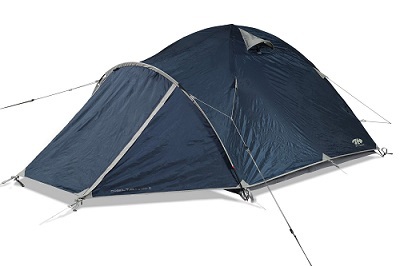
Rain fly
You will see that many summer tents consist of a single layer while others consist of a double layer. This gives us the option to remove the outer protective fabric when the weather is nice and warm and put it back on if it's cold or there's a chance of rain. Certainly the double canvas offers more protection as it is more waterproof than single canvas tents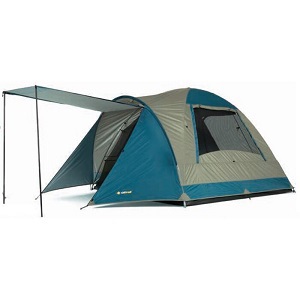
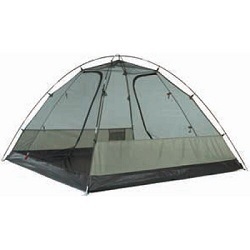
3. Ease of Use
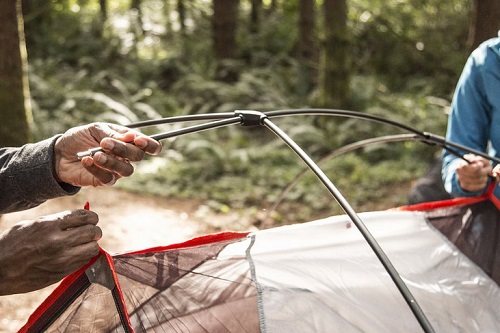
There's no shame in admitting that setting up a tent isn't easy for everyone. There are tents that set up on the fly like pop-up tents, and others that will force you to pull out the instruction booklet. What is certain is that a tent that is easy to set up will be used more. Since setting the tent is probably the first thing you'll do, it's a good idea to avoid starting the holiday with fights and bad moods.
Consider that you may need to set up the tent at night or in bad weather. So choose a tent that is generally quick and easy for you to set up and pack down. Some tents are color-coded so they make setup a lot easier. Ask the seller for all these details before buying!
4. Durability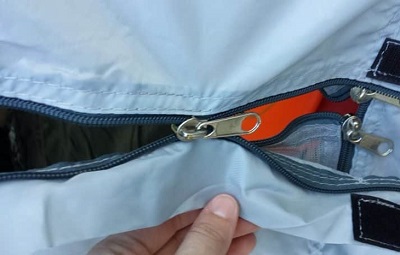
Maybe you need a tent to last just one week a year for a specific outing (like a family outing), or maybe you're looking for a tent to use every weekend. Some tent makers skimp on materials and seams to keep costs down. This may not matter for milder climates or for infrequent users, but if you are a frequent camper, this parameter is important in your final purchase decision.
You can also think of tent durability as a long-term investment. While some tents may seem expensive, if they perform well year after year, you'll get a better return on your money than buying a cheap tent that you have to replace every year.
Pay attention to construction materials especially for the poles, as a broken pole can ruin your vacation unless you've planned to bring spares with you. Some things can be replaced easily, like pegs, and some not, like zippers. As for the pegs, there are different types on the market depending on the terrain you will be camping on (soil, sand, snow, etc.). Be sure to get the right pegs separately for the specific terrain.
Seams are also important, choose tight, clean seams or heat-sealed seams for added strength.
Finally, discuss the return policy with the seller, in case your tent turns out to be unsuitable or defective and you need to return it. Make sure they replace it or refund you.
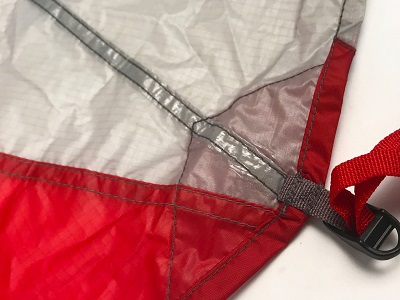
5. Family Friendliness
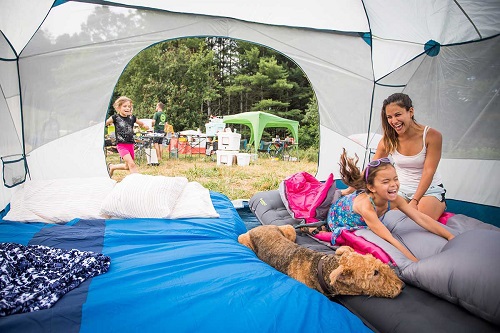
The last parameter we want to look at is family-friendliness. Summer is for most people the most suitable time for family holidays so you should consider all the above factors with a group of people, dogs, children and friends in mind. To properly evaluate a family tent, you need to see if it will comfortably sleep enough people with their mattresses and belongings, if it has storage options for everyone, and if there is a vestibule large enough for you to clean your muddy feet or your dog’s before entering the tent.
You should also think about what will happen to the group if a storm breaks out and everyone has to go inside. Can you cook a meal in the vestibule or will you end up spilling your boiling water in your sleeping bag?
It is also good to calculate "privacy". Are there separate “rooms” that are isolated so someone can change clothes? Are there rooms for children? If you have pets, will they be satisfied too?
An important tip for people with dogs in their tents is to make sure the floor is thick and durable as your pet can scratch to get out.
In general, when it comes to family tents the size of the inner chamber as well as the height are crucial in terms of comfort.
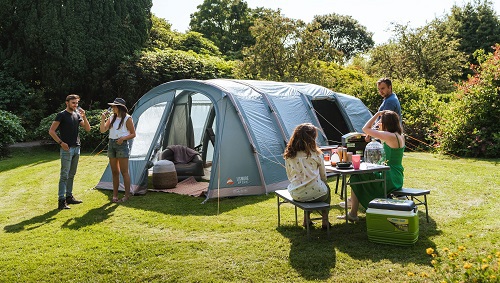
Choosing a tent for the summer may seem like a simple task as the weather requirements are not very high, however it needs a good study before the purchase as comfort and satisfaction during your holiday are crucial to whether you’re going to repeat a camping trip or not.
The low prices often found in summer tents can be very tempting, but we often end up regretting a cheap purchase if the product does not meet our own personal needs.
Therefore it is good to study all the above factors before buying a tent and make the right choice with the help of the seller!
Sourceshttps://www.outdoorgearlab.com/topics/camping-and-hiking/best-camping-tent/buying-advice
https://www.rei.com/learn/expert-advice/family-base-camping-tent.html
https://www.mec.ca/en/explore/how-to-choose-a-tent
Recent posts
-
20/03/2024Guide for crampons
-
19/02/2024Hangboarding for beginners
-
06/02/2024Rock Climbing in Occupational Therapy
-
23/11/2023Climbing Grades
-
22/11/2023Climbing in psychotherapy
-
16/11/2023What is Bouldering
-
15/11/2023Winter Tents
-
15/11/2023Trad VS Sport Climbing
-
07/11/20233 Season Tents
-
03/11/2023Summer Tents
-
02/11/2023Lifespan Of Your Climbing Gear – Part A (Harness, Rope, Slings and Webbing)
-
02/11/2023Lifespan Of Your Climbing Gear – Part B Metal Components
-
30/10/2023What Is “Softshell”?
-
30/10/2023Our Blog
-
30/10/2023Climbing Helmets
-
30/10/2023Base Layers
-
30/10/2023Sleeping Mats
-
30/10/2023Sleeping Bags
-
30/10/2023Waterproof Membranes
-
30/10/2023Mountaineering - Hiking Boots
-
30/10/2023Slacklining, ένας εναλλακτικός τρόπος γυμναστικής.
-
30/10/2023THE LOG BOOK
-
30/10/2023Nikwax secrets of waterproofing
-
30/10/2023INFLATABLE MATTRESS SLEEP
-
30/10/2023Ice axe
-
30/10/2023ΙNFORMATION FOR CRAMPONS
-
30/10/2023Superlight Tents
-
30/10/2023Washing and maintenance of the sleeping bag
-
30/10/2023Climbing Shoes - Quick Buying Guide
-
30/10/2023Nail Vernis Aquaglutene - Vade Retro
-
30/10/2023Mountain cookware
















